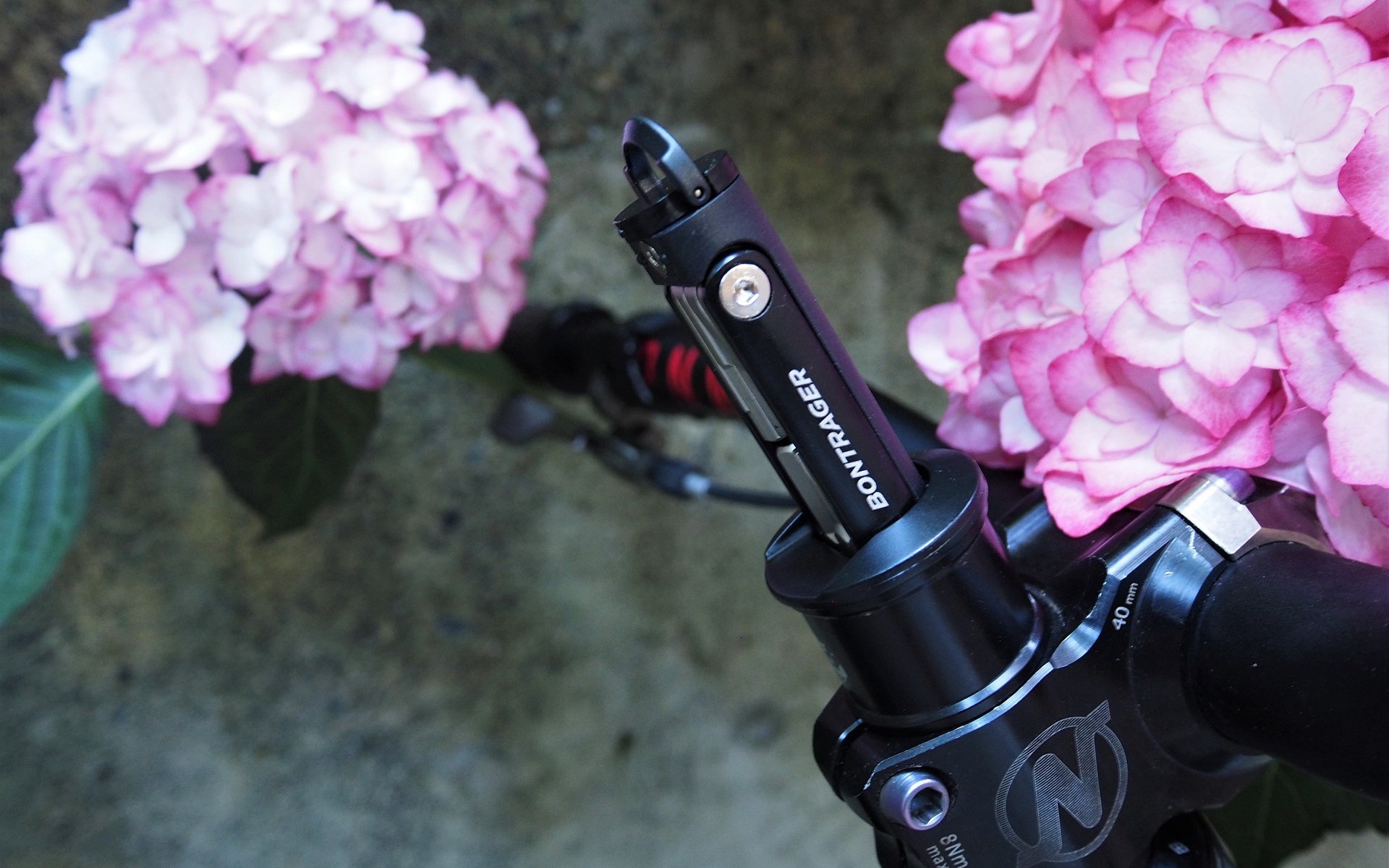
FIRST IMPRESSIONS
Bontrager's Steerer Tube Mounted BITS
Bontrager BITS Integrated Tool
Bontrager's BITS system is a multitool and chain breaker combo that fits into the steerer tube of a fork and tensions the headset via a classic headlock configuration. It fits steerer tube lengths from 165mm to 250mm which should cover most mountain bikes out there.
The 164-gram system includes a 9-piece multitool, chainlink storage, and chain breaker. The tool is fully equipped to handle the majority of trailside adjustments and even includes a half-contact 8mm hex head for folks who are prone to forgetting to check the tension on their crank bolts once in a while.
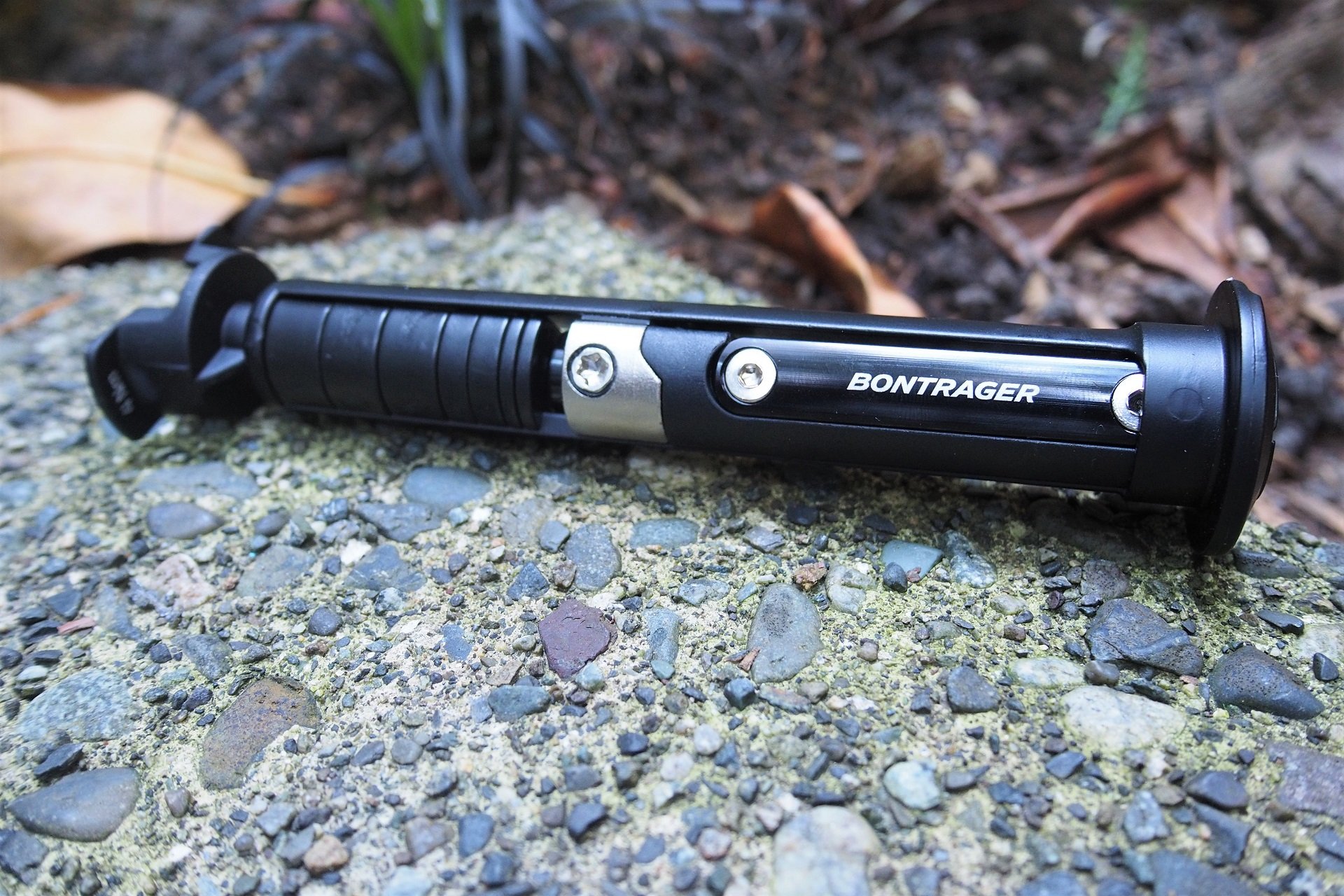
The system weighs 164 grams and rings in at 90 USD, which is competitive with similar setups.
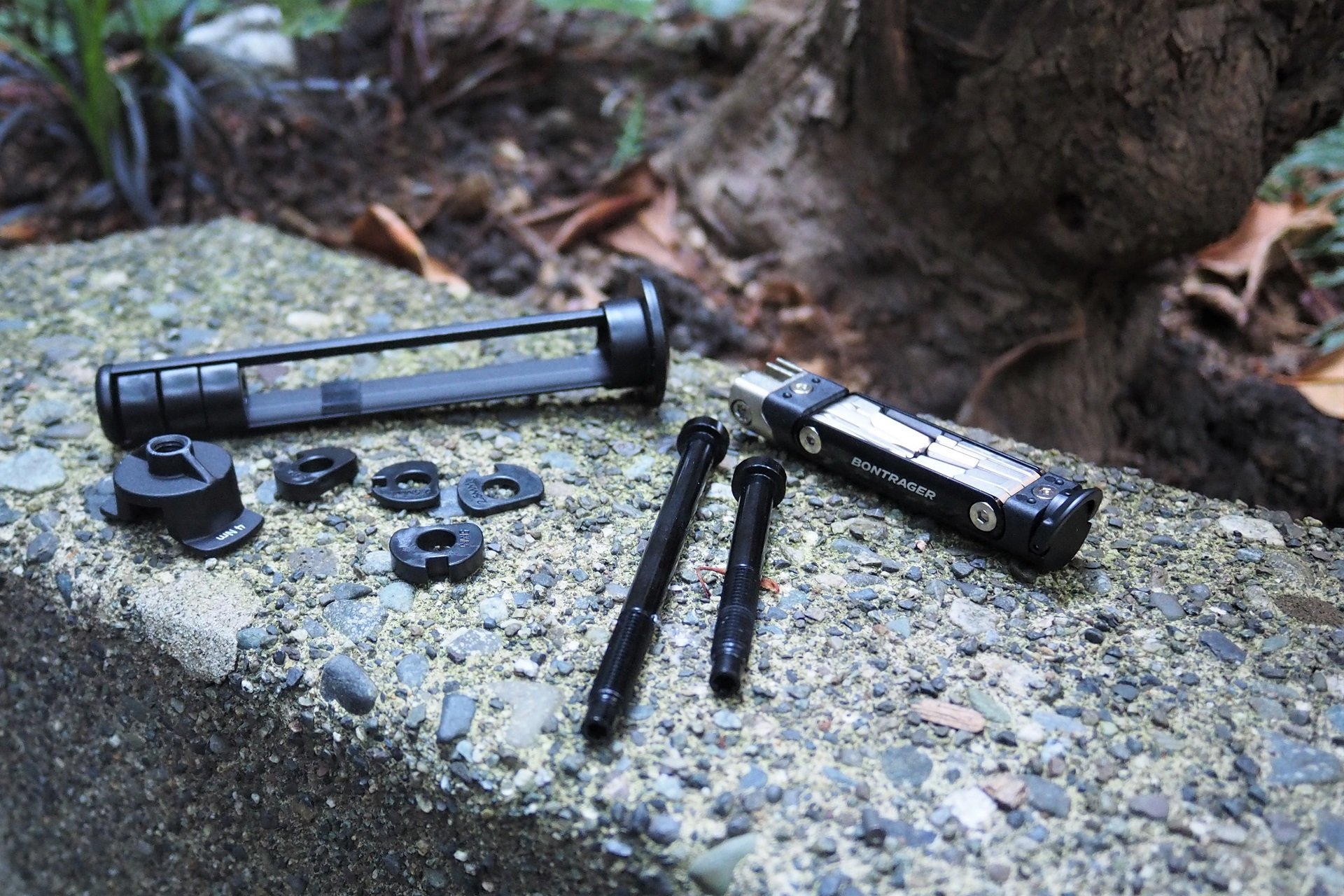
Two bolts and a variety of spacers accommodate 165mm to 250mm steerer tube lengths.
The headlock system includes two bolts and a variety of spacers and weights will vary depending on the combination required to fit a specific bicycle. I needed the longer bolt and most of the spacers to fit the steerer tube on my Durolux, which was left long for future swap-ability.
I tried the base plate with a few forks and the interface seems universal for tapered steerer forks. With the proper spacers and length of the bolt, it's a simple matter of tightening up the headlock using a long 5mm hex key. Please note it's not necessary to use a leverage multiplier on the short end of the hex key here as it's just tensioning the bearings of the headset.
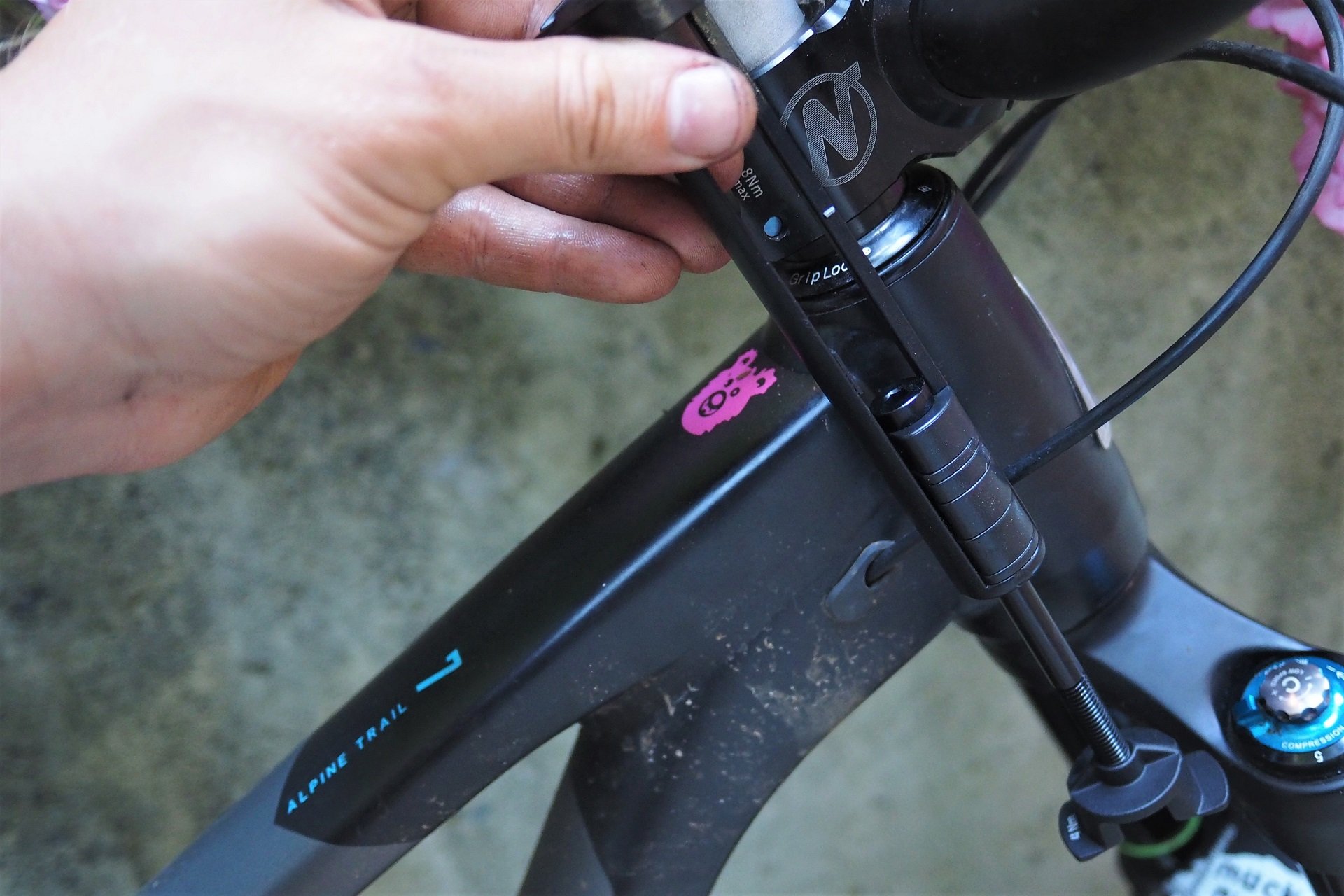
Spacers and long bolt sized up and ready to go. This was very quick to sort out.
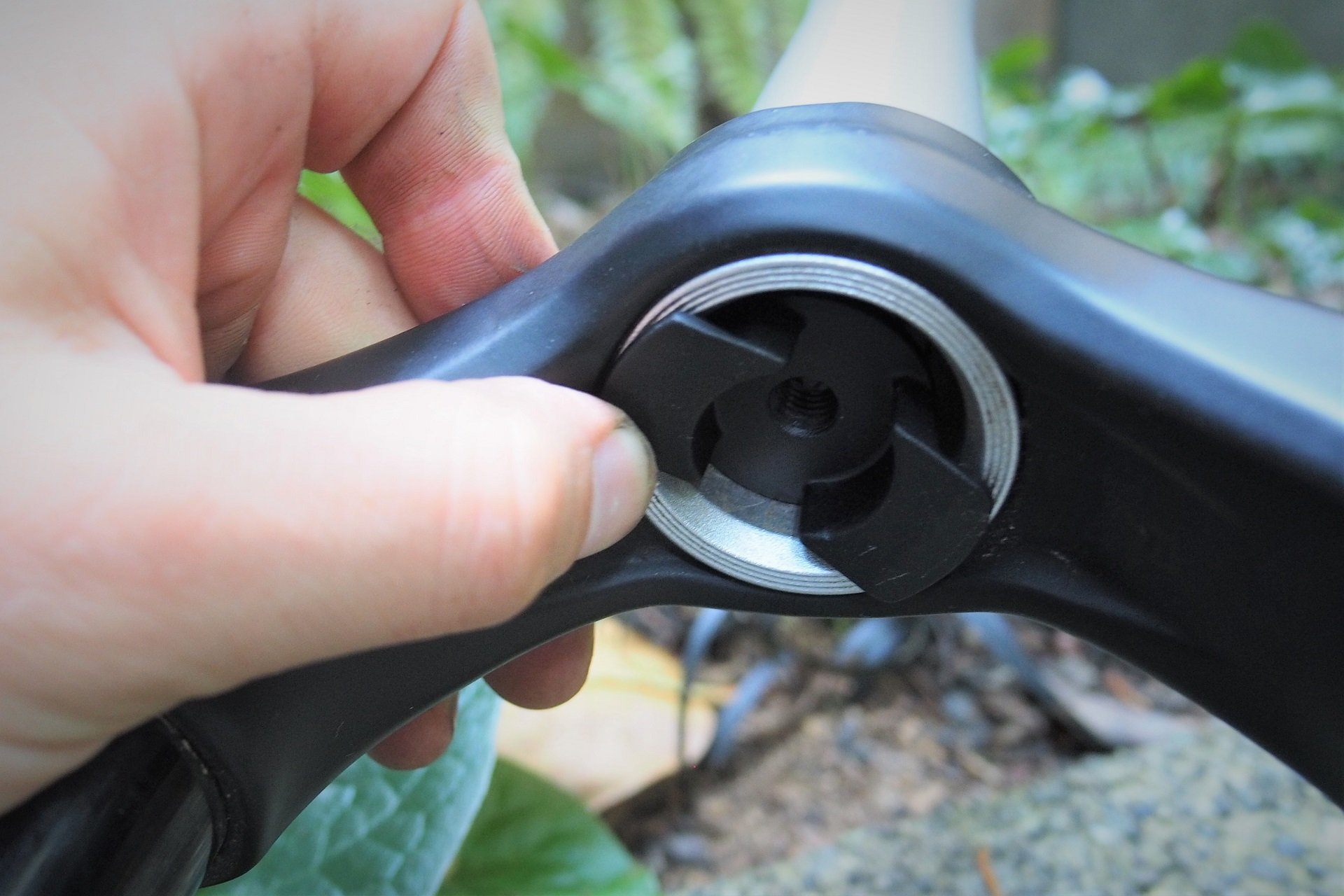
I tried the base plate of the system with a few different tapered forks and I'd say it's universal.
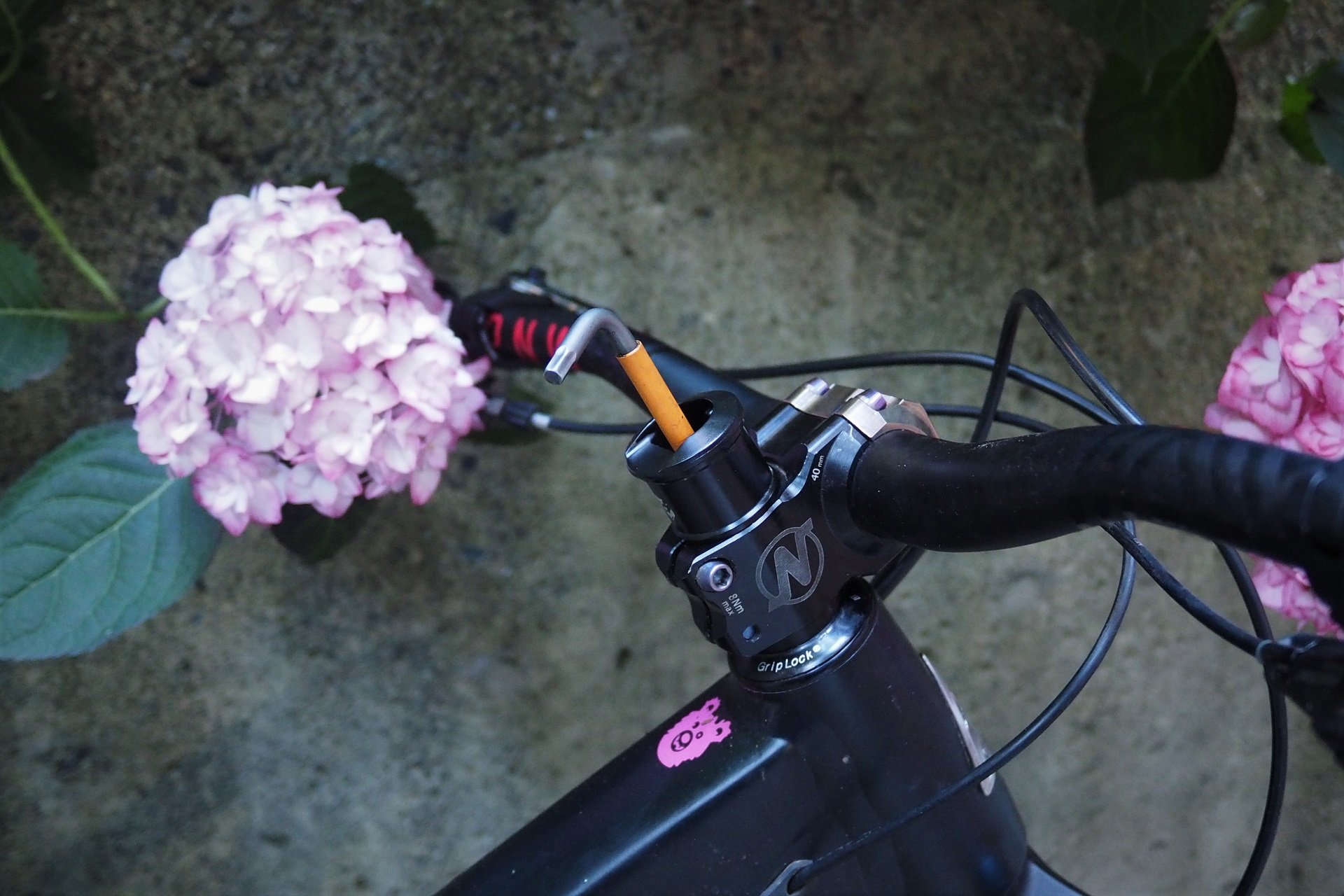
No leverage multiplier needed on the short end of my hex-key. I'm just tensioning headset bearings.
The tool carrier is keyed to the headlock system and everything fits together snug and entirely noise-free. Out of the box, it may actually be a bit too snug as removing the tool with the little flip-up ring on top of the carrier requires a bit of force. It would be very easier to tune how much force is required - with a file - but I'm going to see how it breaks in after a bunch more cycles.
The system is certainly discrete and built in such a way as to meet water out at the top and allow it to drain through the steerer tube. The true test of this kind of tool v. corrosion is really a full winter of rainy rides but between Juneuary and Julyuary it's been a wet summer so far. I'll update readers down the road once I have a few rainy months of using the Bontrager BITS tool.
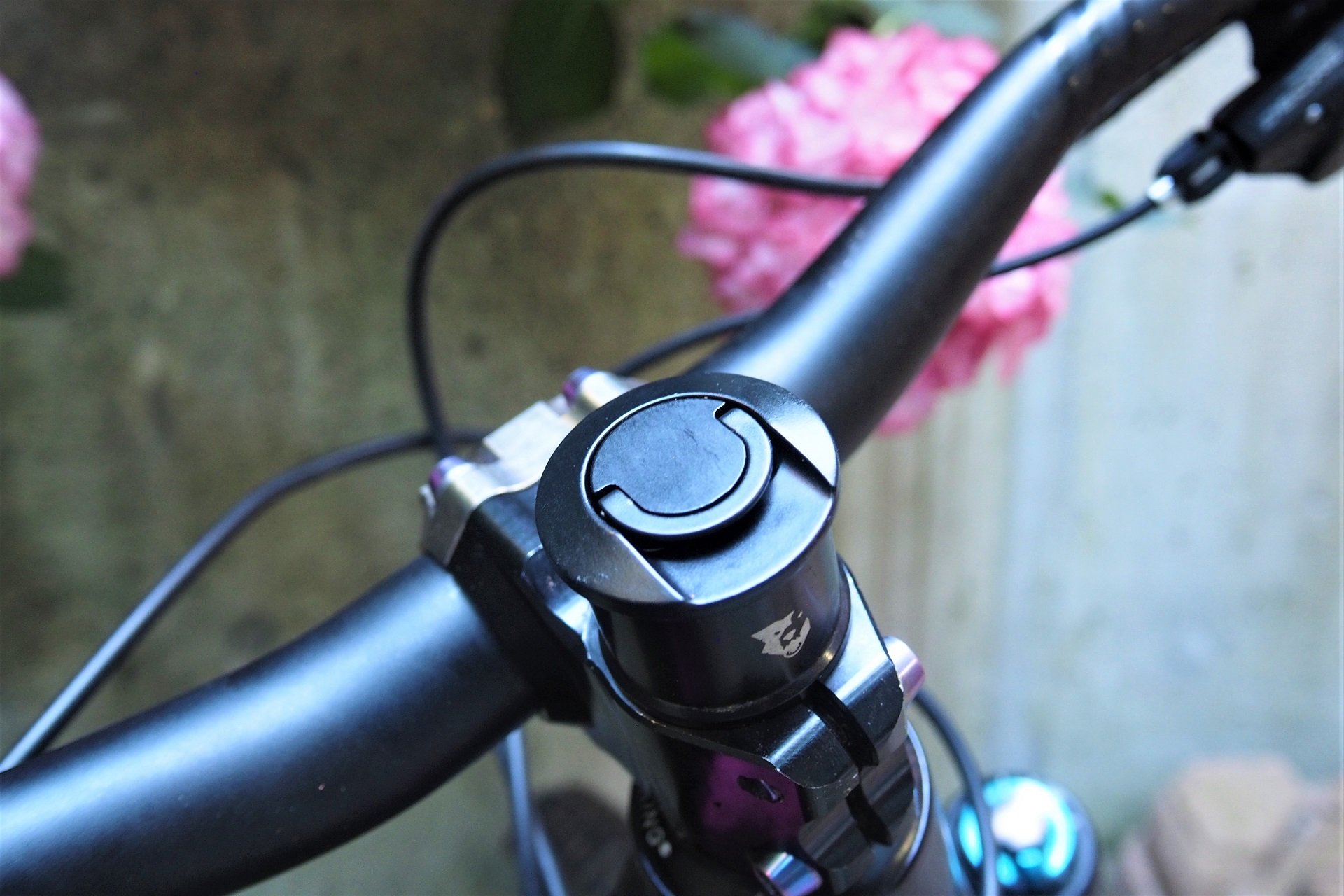
The BITS system is very discrete and it's silent. I do miss my custom #LiveLikeVic stem cap though.
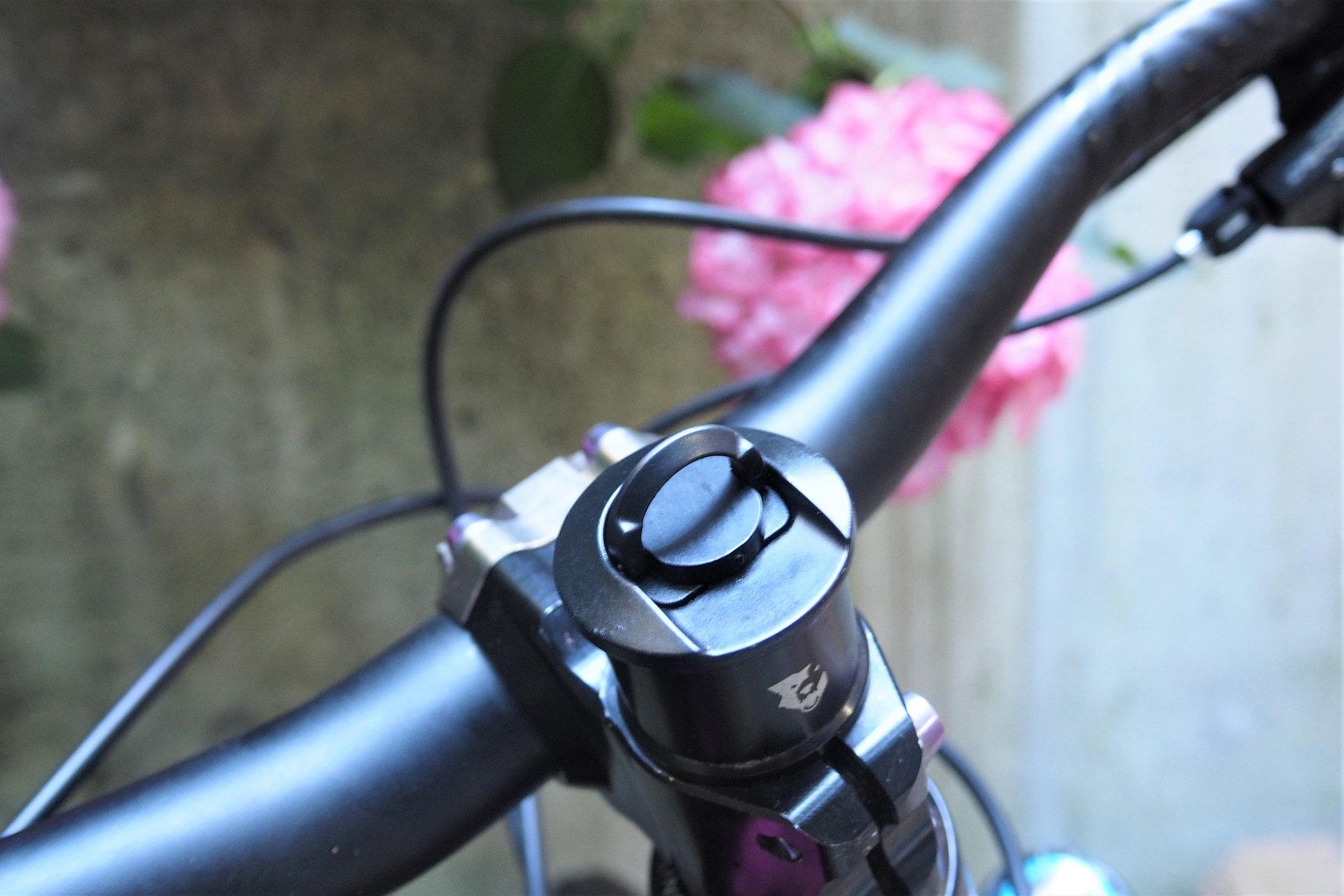
With fresh BITS it takes a bit of oomph on this tiny ring to pop the tool out. It will be interesting to see how that changes with use.
The hex bits are all high quality and even the half-an-8mm bit interfaces fairly solidly with bolts, but this short-handled tool is not one I'm at all stoked to use. I think its true purpose, like Giant's Clutch Tool, is to provide backup for the pack-less, or pack-light, rider with a well-maintained bike who isn't planning to have to make repairs or adjustments on the trail. It's a totally serviceable multitool and chain breaker to get me out of a pinch, but it doesn't cover every eventuality the way my usual include-the-kitchen-sink setup goes.
That said, I don't want to take away from how cool it would be to see the BITS system coming spec on every Trek mountain, road, and commuter bike. For a lot of riders, maybe even the majority of riders, this is all the tool they would ever need when out and about on their bikes. With it mounted in the steerer tube it's impossible to forget it.
Also, with enough of these tools being spec'd and produced, it would be nice to see Bontrager able to bring the price down. These tools present value to riders ditching their packs but, recycling directly from my Wolf Tooth EnCase review: "...a Park IB-2 is a really nice multi-tool for 17 USD and the SKS Tool Box Race has been my German-made favourite for years at around 30 USD." I think for closer to 50 USD it becomes a piece that even riders married to riding with a back- or hip pack would consider for their bikes.
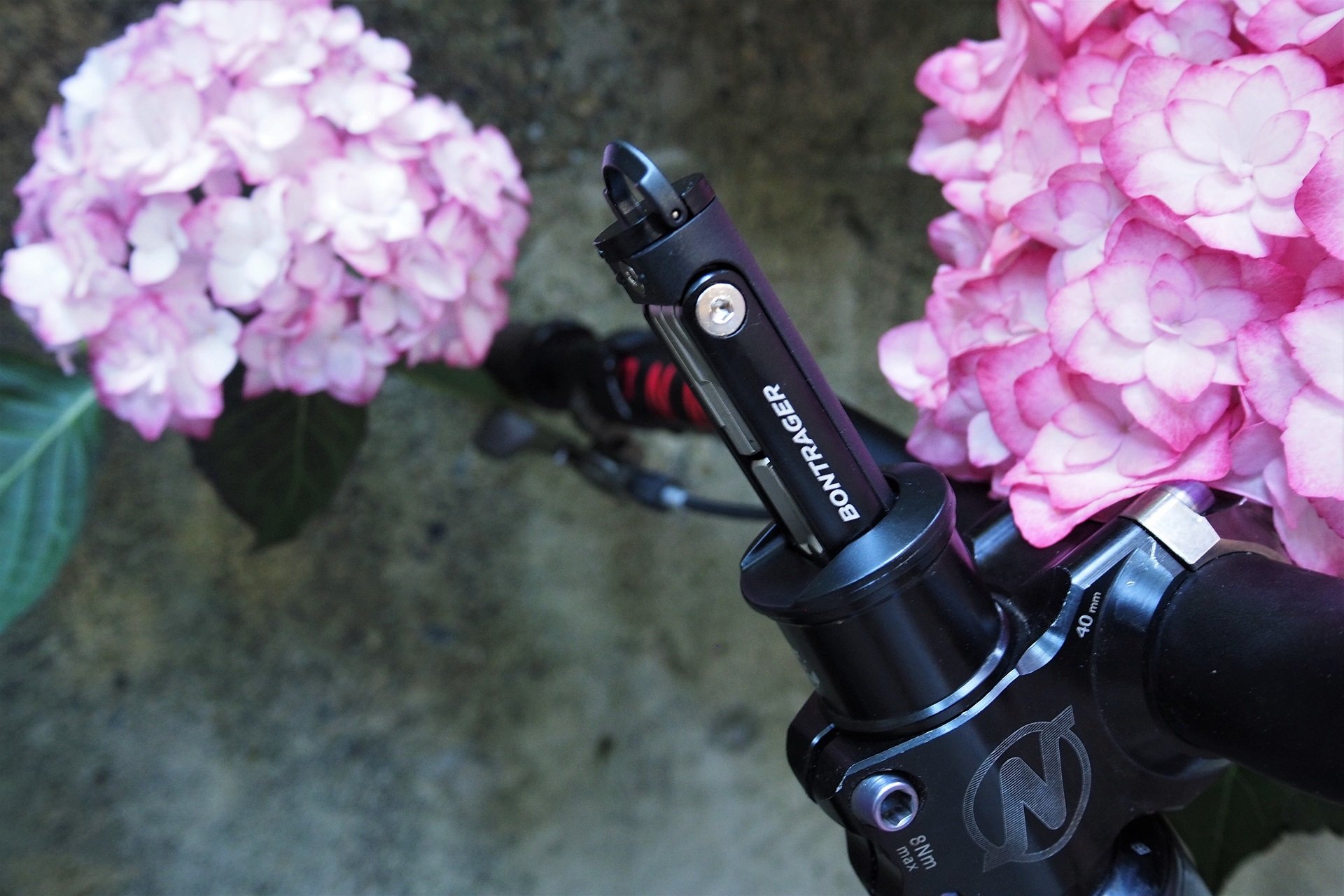
Pop the BITS carrier out of the top. It shares the orientation of OneUp's EDC but reminds me the most of Giant's Clutch crank tool in use.
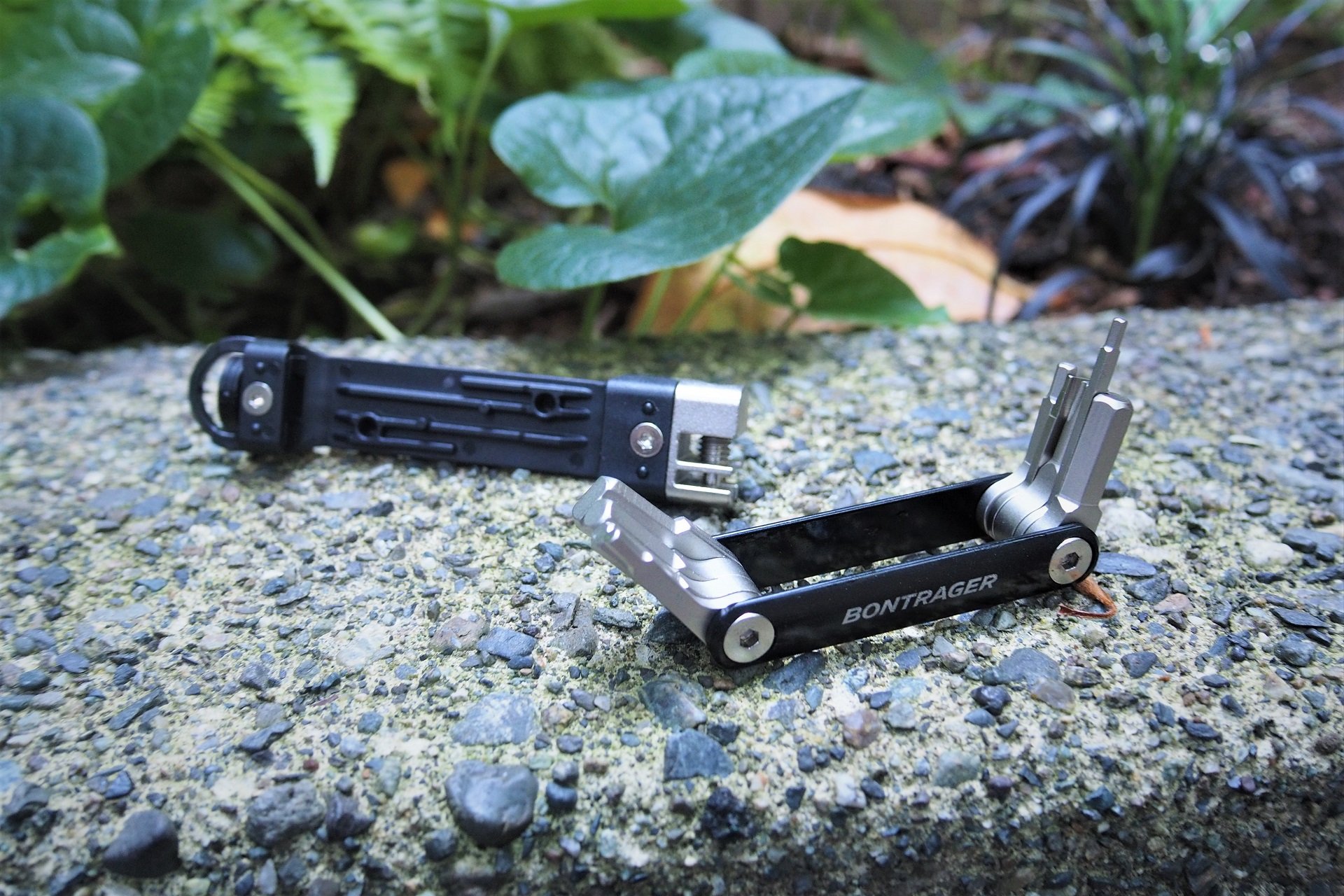
Chain breaker, quick link storage, flat-head screwdriver, T-25, and 8mm, 6mm, 5mm, 4mm, 3mm, 2.5mm, and 2mm hex keys.
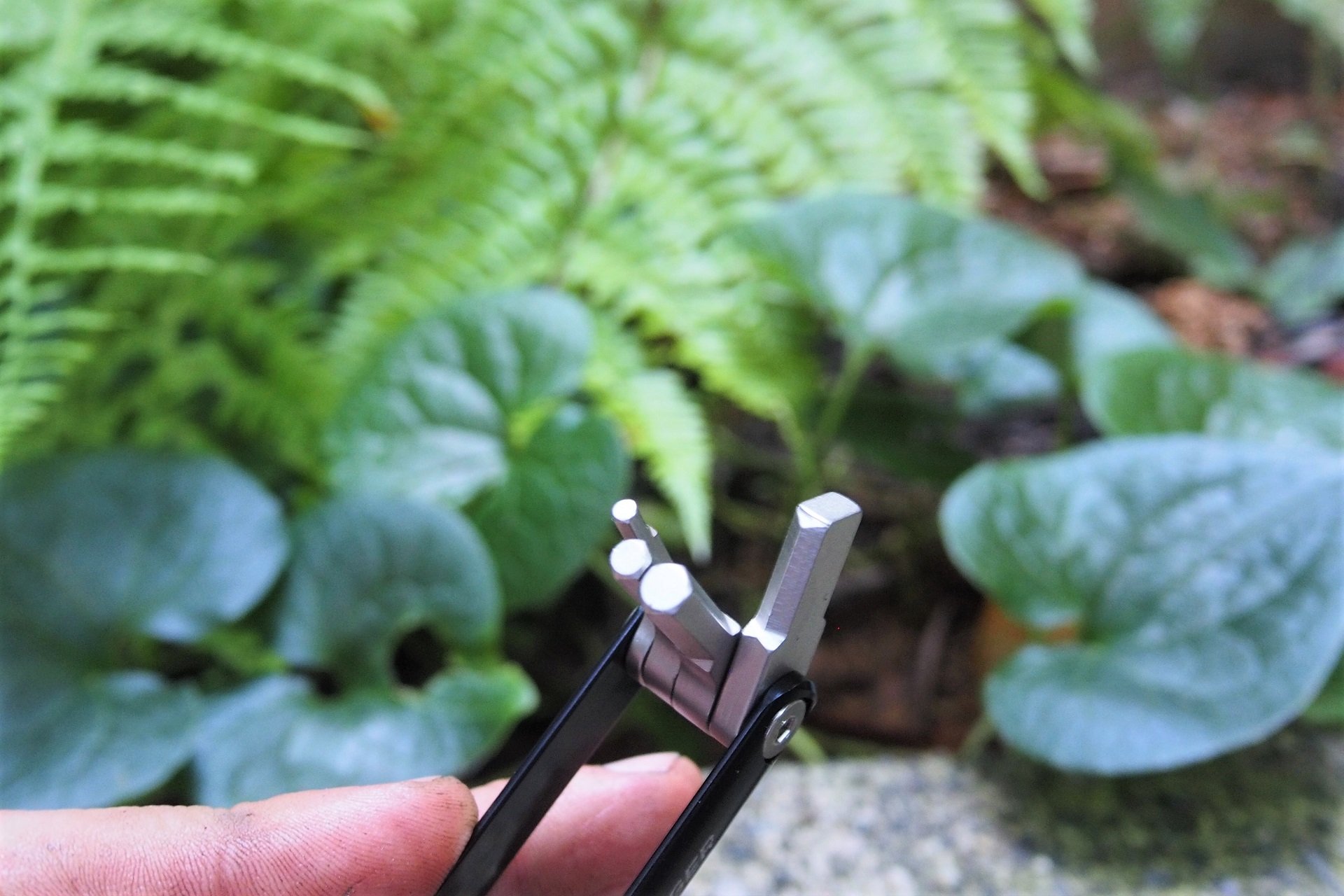
The 8mm is a half-contact situation and the 6mm hex has a cut out to interface with the 2mm. These are trail-side emergency tools, not working-in-the-shop tools.
I'll be using the BITS system for all my trailside tuning on my Marin for the new few months which legitimately means that combined with the B-Rad frame-bag that I can truly ride without a pack. I very rarely have mechanicals so I'll be sure to incorporate some adjusting for adjustments' sake.
I do enjoy having the tool on hand ready to go and, as other companies have proven, the steerer tube is a great place to stash the tools a rider most often needs on the trail, and significantly more universal than using crank axles or handlebars. For me, it comes down to whether the tool is nice enough in use - in rare situations when I do need one - that the true convenience overcomes the price and increased functions of a tool carried with a pack.
For more information on Bontrager's 90 USD BITS system check out Trek's tool selection.
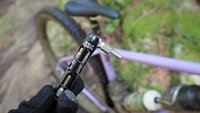

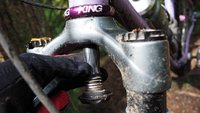
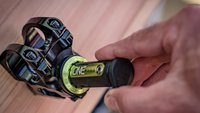


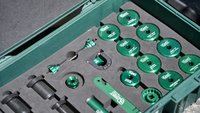
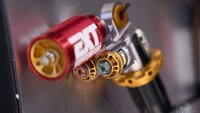



Comments
Shoreboy
3 years, 9 months ago
How could they not have capitalized on this by using Trek rather than Bontrager for the name for this? :)
Reply
Andrew Major
3 years, 9 months ago
I think “Bontrager’s BITS” has an un-Trek-like cheekiness to it. :-)
Reply
Andrew Major
3 years, 9 months ago
Hahahaha. Never mind. I had a couple slugs of coffee and then I got it... Trek Integrated... I’m not usually that slow.
Reply
Brumos73
3 years, 9 months ago
i'm a bit confused with these pics... is that your steer tube sticking way up above your stem? What is that Wolf Tooth thing?
Reply
Andrew Major
3 years, 9 months ago
"That Wolf Tooth thing" is a headset spacer.
That fork has been on frames with headtubes so big I only need a 5mm spacer; my Alpine Trail is not one of those frames. In that picture, I'm also running a higher rise bar than I normally ride on my Marin which necessitated lowering my stem.
Bikes = Adult LEGO.
Reply
Endur-Bro
3 years, 9 months ago
I couldn’t figure out pics 7-8 with the WTC logo. Now I do.
Reply
Andrew Major
3 years, 9 months ago
I needed some headset spacers. They make nice headset spacers...
The big ones (20mm, 25mm, 30mm) all have a wolf logo.
Reply
Nouseforaname
3 years, 9 months ago
Re: Comment about how tough it is to get out of the steer tube. I have resorted to sliding my glove through the little loop to get some force on it to pull it out. Can't do it with fingers. It's been in and out a half dozen times so far - twice on the trail. My bike has the SRAM UDH (8mm), which means that this tool, along with a CO2 and tube/lever stored in the DT and a spare hanger strapped to my seat rails has me covered for most likely on trail mishaps. Feels very liberating to go without ANY pack on the trail, but I've never been a kitchen sink kind of guy - in fact I've certainly carried LESS than this, even with a Camebak on!
Garmin on the TT, and now I don't carry my phone. I need to remedy that, as solo rides are a lot less comfortable without some way to call home, even if home knows which trails I'll be riding.
Reply
Andrew Major
3 years, 9 months ago
Mine comes out with a very sharp tug. Glove trick is interesting - will try.
Have you tried modifying the tool to slide easier? I’m on the fence as I certainly don’t want it to rattle.
Reply
Andrew Major
3 years, 9 months ago
Been thinking about this a fair bit. I don’t need to use tools on 95% of my rides and when I do it’s a 4-5-6mm hex 99% of the time. Not even sure the last I pulled my pump out and in fact the only things I’ve used in my frame bag are my buff and tire plugs to help a friend.
But I always carry a knife, pliers, plugs, pump, and full range of tools regardless. Why? Because I have needed them in the past to not have to walk home (and it can be a fairly solid distance that as I usually ride from home).
It’s an interesting conundrum. Once I’m done this tool test I may play around with minimizing to the tools I’ve actually used in the last year.
Reply
ackshunW
3 years, 9 months ago
Looks great, probably similar to the Granite tool but I (baselessly) suspect height quality. But WTH? Trek site lists it at $118 US. That puts it completely in line with one-up + topcap + tap.
Reply
mrbrett
3 years, 9 months ago
A Specialized SWAT tool is remarkably similar to this, but $120 CAD.
Reply
Andrew Major
3 years, 9 months ago
SWAT has been around a lot longer, so it’s maybe unfair to compare it apples:apples since Trek had a lot of prior art to build on... but, in any event, BITS is a much more useful tool with the addition of the 2mm and 2.5mm hex keys.
The chainbreaker is also much more practical to remove and nicer to use.
I also think that while the spring-eject system on the Specialized tool is a cool gimmick, the manual pull out of the Bontrager will hold up much better over time.
That said, I’d be surprised if Specialized wasn’t working on a next gen tool.
Reply
mrbrett
3 years, 9 months ago
I have to admit, with an 11s XT derailleur I do miss the 2mm hex.
Reply
Andrew Major
3 years, 9 months ago
The most frequent issues I've seen that require a 2.5mm or 2mm hex are dropper post cables that have come loose.
Reply
Andrew Major
3 years, 9 months ago
It’s 90 USD / ~118 CAD. Which I believe makes it a twoonie or so of a better bargain in Canada today.
Reply
danimaniac
3 years, 9 months ago
does it sit flush then, if you have a cut fork? I understand you're using this massive spacer to not have to cut your steerer?
How does it compare to the Encase Multitool? I understood that was your go-to-tool?
Reply
Andrew Major
3 years, 9 months ago
It’s recommended to always have a headset spacer (3mm or 5mm is fine) above your stem.
The upper portion of the BITS carrier (what replaces a stem preloaded cap) sits flush. So if you aren’t running a spacer above your stem it will work fine.
As per my comment above, I keep my steerer tubes long to effect swapping between different frames and testing different bars. If they were forever combos I’d trim them.
-
I don’t think BITS and EnCase are really comparable products. Or at least, I see different users/use cases for both tools and can’t see anyone being undecided between the too.
To compare to other tools, BITS is certainly in the camp of OneUp’s EDC where EnCase is like Fix-It-Sticks with a handlebar cattier.
-
BITS is a 9-function multi-tool with the leverage to tighten loose larger (8mm & 6mm hex head) bolts and perform adjustments. It’s on my Marin as it’s perfect for tuning my shock (3mm), straightening my stem (5mm), and removing my rear axle (assuming it’s properly greased and not overtightened - 5mm or 6mm). The steerer tube mounting system is ~ universal.
EnCase is a 14-function tool with enough leverage to install a set of RaceFace cranks (8mm), to adjust the swingers on my single speed (6mm), to properly crank down rotor bolts (T-25), and extra functions (T-10, Spoke tool, valve core tool) that are handy. It’s on my Walt because I do sometimes tension my chain in the woods (even though I certainly try to make sure my bikes are dialled before leaving home). The ironic thing with EnCase is a lot of people I know who’d have the money to buy the system without a second thought have carbon bars with too narrow an ID to run it.
In terms of use, EnCase takes more fiddling than BITS to use so for someone on the clock BITS is going to be a much faster option. It’s also the simpler tool for folks prone to losing stuff on the trail (I have no doubt folks have lost individual EnCase bits already).
On the other hand, EnCase is much, much closer to being a shop-tool experience on the trail. It’s genuinely pleasant to use. If I was going on a road trip I’d take proper individual duplicates of everything in the BITS tool in my car. With the EnCase that wouldn’t be necessary.
Hope that’s helpful.
Reply
samnation
3 years, 9 months ago
Correct me if I'm wrong, but there's no way to adjust your headset once the tool is in there? With 1up they give you that little spanner to tighten a lockring (not install, only tighten in an emergency). From what I see here it looks like you used a long ball end to put it in?
Reply
Andrew Major
3 years, 9 months ago
To adjust the headset you pull out the tool and insert the long end of a 5mm hex in. Certainly not a big deal at home; however on the trail it would not be doable unless if you’re riding with someone with a full sized hex keys.
Probably not a big concern for most riders?
Reply
ackshunW
3 years, 9 months ago
I saw on Pinkbike that the preload screw has a T25 cut into the thread-end (bottom) so you can tighten with a stubby tool (or the multi tool itself).
Reply
Andrew Major
3 years, 9 months ago
Good eye! Did not notice it but indeed there is a T-25 interface at the bottom.
Reply
samnation
3 years, 9 months ago
Certainly not a big deal! But I guess it's the one thing you're giving up over a traditional headset and multi tool in your pocket so to speak.
Reply
Please log in to leave a comment.